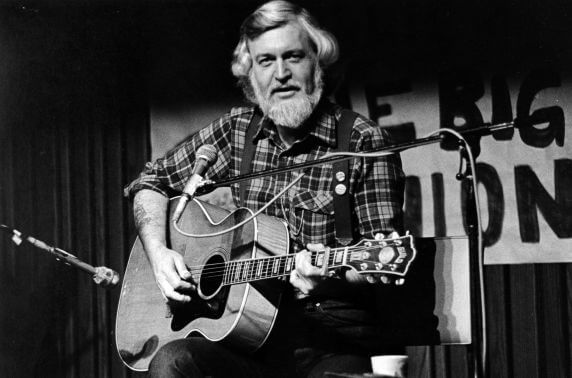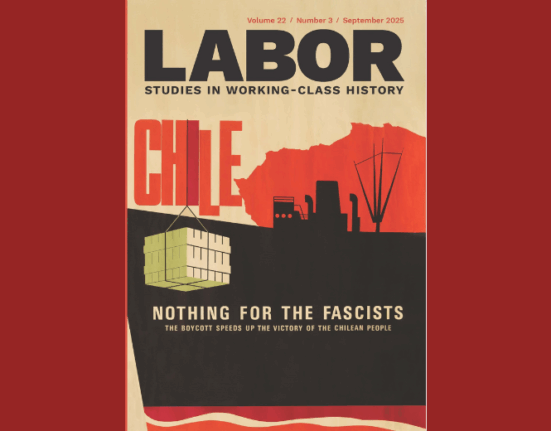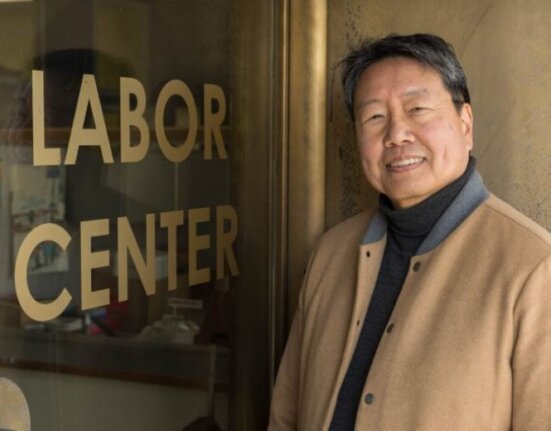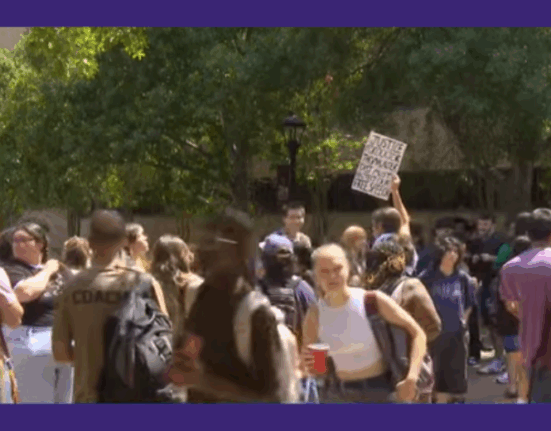Originally posted October 16th, 2014. Written by Dallas Pillen, Archives Technician at the Walter P. Reuther Library, Archives of Labor and Urban Affairs, Wayne State University.
Bruce Duncan “Utah” Phillips (1935-2008) was one of the most prominent members of the American folk community in the latter half of the 20th century. He became well known as a folk singer, storyteller, poet, radio host, and activist beginning in the late 1960s and continued to be a distinguished figure in the folk and labor communities for the following four decades. The Walter P. Reuther Library, the repository for the Utah Phillips Papers, is pleased to announce that the collection is now open for research.
Utah Phillips was born in Cleveland, Ohio on May 15, 1935 to a labor organizer father and a mother with radical politics. His family moved to Salt Lake City, Utah in the late 1940s, during which time Utah learned to play the ukulele. He learned to play the guitar and honed his songwriting skills while working at Yellowstone in the early 1950s, and further developed as a musician while serving in the United States Army in the Korean War. Utah’s experiences in the war also had a significant impact on his political views, influencing his later commitment to pacifism.
Utah spent some time riding the rails and writing folk songs after returning from Korea. He returned to Salt Lake City in the early 1960s and began writing songs for his friend and fellow musician Rosalie Sorrels. It was also during this time that Utah met Catholic Worker Ammon Hennacy and began to work at the Joe Hill House of hospitality, experiences which strengthened his commitment to social justice, pacifism, and anarchist politics. Utah Phillips was working for the Utah State Archives in 1968 when he ran for Senate as the candidate for the Peace and Freedom Party. He lost the election, but caused enough of a problem for the established political powers in the state that he lost his job at the State Archives and was no longer able to find employment in the state. He left Salt Lake City for Saratoga Springs, New York where he began performing his songs at Caffé Lena. Spurred by his success at Caffé Lena and the encouragement of other signers and performers, Utah Phillips began his career as a traveling folk singer and storyteller in earnest.

For the next four decades, Utah was a staple at folk festivals, a perennial touring musician, and ultimately became one of the distinguished elders of the folk music community. He recorded several albums, including Good Though! and El Capitan, in the early 1970s. He was introduced to younger and more mainstream audiences through collaborations with Ani DiFranco in the 1990s, including 1996’s The Past Didin’t Go Anywhere and 1999’s Fellow Workers. Utah maintained the rights to most his songs and worked exclusively with small independent labels, going so far as to refuse opportunities to license his songs to musicians on major corporate labels. A famous example of this, documented in the Utah Phillips Papers, involved Utah turning down a licensing request from Johnny Cash.
In addition to his successes as a folk singer, songwriter, and traveling musician, Utah’s professional career included other forms of writing, storytelling, and public performance. He was the host of his own nationally syndicated radio show, Loafer’s Glory; wrote several published works of poetry, including Cuyahoga and Other Poems and The Old Guy Poems; and published articles and had columns in several newspapers and folk music periodicals.
Alongside his career as a folk singer, traveling musician, storyteller, poet, and writer, Utah Phillips was actively involved in a number of political and social activist causes. He became familiar with leftist politics and organized labor early in life through the influence of his parents, and gravitated toward the Industrial Workers of the World (IWW) while at Yellowstone. He became a lifelong member of the IWW after returning from Korea and was ultimately one of the most prominent modern advocates for the organization, oftentimes being compared to early Wobbly troubadour Joe Hill. Utah was also involved in other aspects of labor activism and organizing, peace and anti-war activism, environmental activism, advocacy for hoboes and the homeless, and many other political and social causes. He was a member of several Unitarian Universalist congregations and had numerous scholarly interests, among them Egyptology, linguistics, and history. Utah Phillips passed away on May 23, 2008 in Nevada City, California.
Utah’s widow, Joanna Robinson, selected the Walter P. Reuther Library of Labor and Urban Affairs as the home for the Utah Phillips Papers because the Reuther is the official repository for the IWW. The papers came to the Reuther in what Utah himself described as “about 15 collapsing cardboard boxes that contain what academics have characterized as my personal archives, but are in fact a jumble of papers and objects, the detritus of over half a century.” That jumble of papers and objects was processed, weeded, arranged, and described into a rich collection that documents Utah’s life and career and serves as a valuable resource for those interested in American folk music, anarchism, pacifism, and labor activism in the second half of the 20th century.

The collection contains a variety of record types and subjects documenting Utah’s personal, professional and political activities from predominantly 1968 to 2008. Included in the collection are records related to Utah’s career as a folk musician, performer, songwriter, storyteller, poet, writer, and radio host. The papers also reflect his political and social activism, including his 1968 campaign for Senate and his involvement with the IWW, labor unions, environmental groups, peace advocacy organizations, and Unitarian Universalist congregations.
One of the greatest strengths of the collection is its documentation of Utah’s professional activities. The series dedicated to his career includes several materials of note, including drafts of songs, poems, essays, and stories; documentation of performances including set lists and tour itineraries; notes, agendas, and texts for his radio show; correspondence with fellow musicians including Pete Seeger, Johnny Cash, Ani DiFranco, Rosalie Sorrels, Kate Wolf, and Faith Petric; and audiovisual materials such as photographs, posters, audio and video recordings, and memorabilia mostly related to Utah’s career as a singer and traveling musician.

Evidence of Utah’s commitment to political and social causes can also be found in the collection. Aspects of Utah’s efforts on behalf of political and social causes documented in his papers include his involvement with the IWW and other labor groups; his pacifist activism including his involvement with the Peace Center of Nevada County and numerous veteran’s peace organizations; his 1968 campaign for Senate and his less-than-serious campaigns for President of the United States; his environmentalism including his participation in the Earth First! Redwood Summer project in the early 1990s; and his affiliation with hobo and homeless advocacy groups including the National Hobo Foundation and the Burnside Community Council. The papers also document Utah’s faith through texts and programs for sermons delivered by Utah to Unitarian Universalist congregations. Finally, the papers include evidence of Utah’s scholarly pursuits in the form of his personal notes and essays and subject files containing reference materials for areas of particular interest.
The Utah Phillips Papers are a unique and meaningful addition to the Reuther’s archival holdings. They present scholars, students, folk music performers and aficionados, and others with an opportunity to learn more about Utah himself, the art he created, the causes to which he dedicated his life, the people and organizations with which he interacted, and his inimitable contributions to the world in which he lived.







